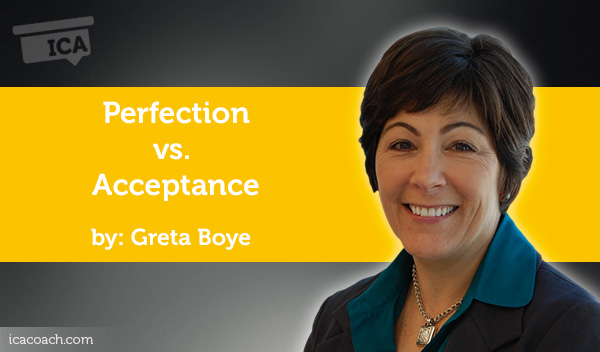
A Coaching Power Tool Created by Greta Boye
(Career and Life Coach, UNITED STATES)
Most people would likely agree that there is nothing wrong with doing things “right”. One could easily argue that there are as many situations where there is a “right” way to do somethings as there is a “wrong” way to do some things; others might argue that in some cases there is no “right”or “wrong” way at all. Perfectionism is about the extreme degree of doing things right, or holding some thing or someone to the highest standard as possible, as seen through the eyes of one person. Acceptance, in contrast, does not necessarily imply a standard. In its simplest terms, acceptance implies the act of receiving something offered and believing that perfection is not always achievable or desired. Like perfectionism, acceptance is personal.
Perfectionism
The only real mistake is the one from which we learn nothing.- Henry Ford
Being perfect is a big job. So-called neurotic perfectionists typically fear that they may not succeed or do as well as they would like. Critical self-judgement often results in procrastination, insecurity, and feeling that nothing is good enough. Some people feel that there is always a ‘monkey’ on one’s shoulder that is criticizing every step along the way. Obsessing about making small mistakes often leads to missing the big picture. And failure is a bad word –being perfect involves having an all or nothing mindset.
Acceptance
Self-Acceptance is my refusal to be in an adversarial relationship with myself.– Nathaniel Branden
Acceptance involves a choice that is different than perfectionism. By definition, acceptance is the act of receiving something or someone for what it, or he or she is. Judgment is absent, as is regret. The feeling of acceptance is peace, letting go of negativity, and just being. Learning to accept might require some work, too. Some people might give that ‘monkey’ a name and eventually ask him to go away. Acceptance is liberating.
Coaching Application
When self-criticism or negativity as it relates to perfectionism starts to surface, consider asking your client a few of these questions to create action and new ways of thinking:
Conclusion
Perfectionism is a never-ending cycle. One can spend a lot of time, energy, and effort holding others or himself to high standards, many of which are never achieved. Acceptance is simply receiving without judgment. If acceptance seems too far a leap for some to overcome perfectionism, a coach can partner initially with a client to take actions to become a “healthy” perfectionist, and then move towards unbiased acceptance.